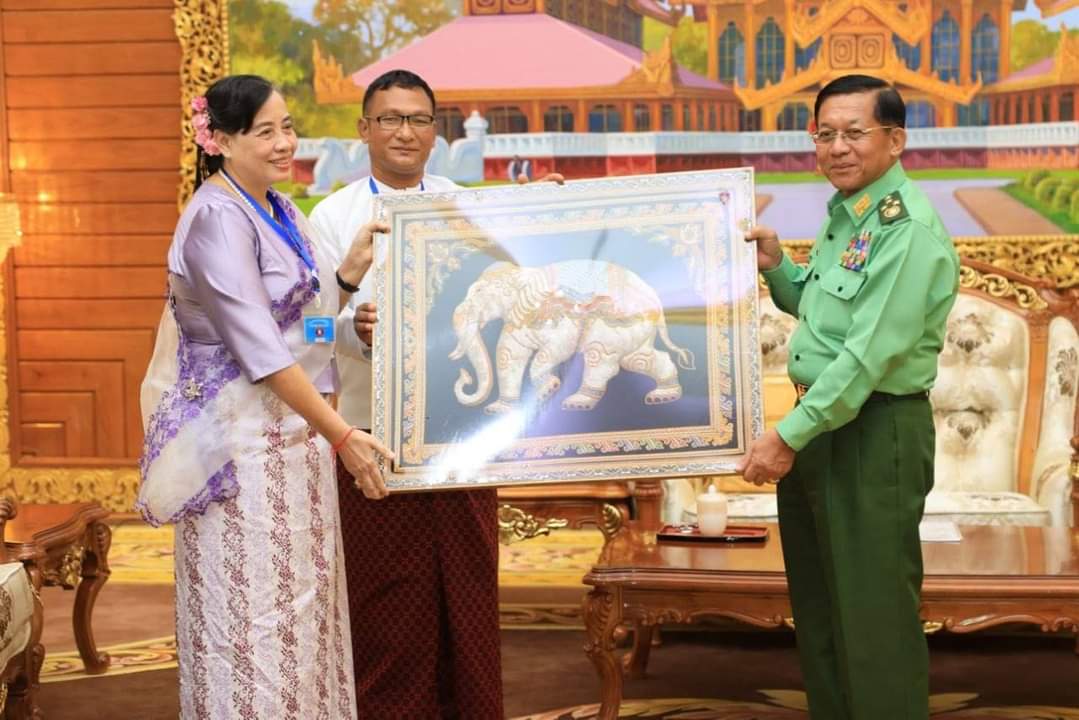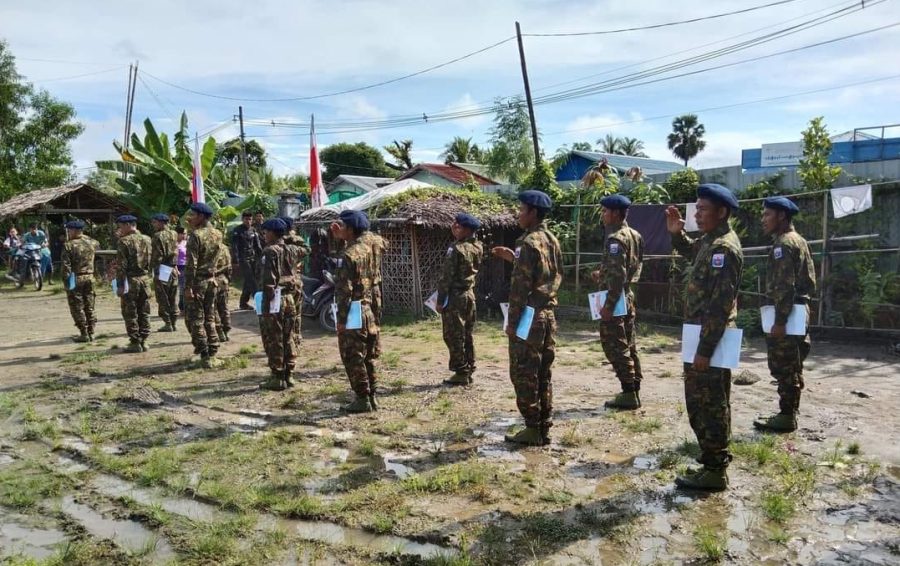- Free schools for IDP children in Arakan State struggle to stay open amid funding shortfall
- Female-headed IDP households in Ponnagyun Twsp struggle as commodity prices surge
- Min Aung Hlaing likely to take State Counsellor role in post-election government formation: Analysts
- Hindus express hope for educational reform under AA administration
- Arakanese zat pwe performers struggle to survive as conflict halts traditional shows
As Regime Loses Grip on Arakan, Does ALP Have a Viable Future?
12 Sep 2024

Written by Aung Thura
Myanmar's military regime continues to lose ground in the fighting in Arakan State, suffering successive defeats since the Arakkha Army (AA) launched an offensive in November of last year. The ethnic army has seized control of the majority of townships in the state, with fighting escalating in Maungdaw, Thandwe and Ann townships.
As the regime cedes more territory in Arakan State, many are interested in the fate of the Arakan Liberation Party (ALP), which has been cooperating with the regime since the 2021 putsch.
The AA has publicly claimed itself as the sole army in Arakan State, which is a cause of existential concern for the ALP.
The ALP: A History Measured in Decades
The ALP and its armed wing, the Arakan Liberation Army (ALA), were formed on April 9, 1967, for the stated purpose of liberating and ensuring full ethnic rights and self-determination for Arakanese people.
Over the past 57 years, the ALP has only engaged in political dialogue, and barely engaged in armed struggle. It joined peace talks with the two elected governments between 2011 and 2020, but could not bring about any significant changes in Arakan State.
It signed the Nationwide Ceasefire Agreement (NCA) with U Thein Sein's government on October 15, 2015.
Though it never publicly reveals its strength, analysis reports from the Institute for Strategy and Policy and Burma News International-Myanmar Peace Monitor suggest that the group only has around 200 troops.
A power struggle in 2022 saw party members splintering into three groups - one is led by Khaing Ye Khaing, another by Khaing Soe Naing Aung and a third by Saw Mra Razar Lin.
The ALP led by Khaing Ye Khaing is based on the India-Bangladesh border and the ALP led by Khaing Soe Naing Aung is based on the Thai-Kayin (Karen) State border, with only a few dozen members.
The ALP led by Saw Mra Razar Lin is the largest of them. It has joined junta-organised peace talks. Its headquarters is based in Sittwe's Set Yone Su Ward. It has also joined junta troops on their routine patrols of the town.
According to sources close to the ALP, the party proposed in 2022 that it be transformed into a Border Guard Force. The military regime rejected the idea, as the benefits of keeping the ALP in its bogus peace talks as a dialogue partner outweighed the benefits of using a small army of fewer than 200 inexperienced troops in the fighting.
The regime blockaded roads and waterways in Arakan State after the AA launched the offensive in November. I have witnessed junta soldiers and ALP members extorting money from Sittwe residents wanting to flee the town.
The ALP also helped the regime recruit low-income families trapped in Sittwe by offering money and other incentives. The ALP has also joined the regime in fortifying Sittwe and abducting civilians.
The gravest sin of the ALP was when it joined the regime in the massacre of villagers in Sittwe Township's Byaing Phyu Village in late May.
Byaing Phyu villagers and the AA claim that ALP members joined junta soldiers in the brutal killings of at least 76 residents in the village. The ALP has denied its involvement in the massacre.
The group also released a statement against the fighting in Arakan State on June 18, using words widely viewed as appeasing the regime.
Longstanding AA-ALP Tensions
In addition to junta and AA forces, the ALP, Arakan Rohingya Salvation Army (ARSA), Arakan Rohingya Army (ARA) and Rohingya Solidarity Organization (RSO) are all active in Arakan State.
The AA's territorial advances are blows most seriously felt by the military regime and the ALP, given that the AA has a policy that there should be no armed groups other than the AA in Arakan State. It can be reasonably surmised that the AA's policy brought the ALP closer to the military regime.
When the AA began military operations in Arakan State, it had problems with the ALP, which was already present in the border area of India, Bangladesh and Myanmar. As tensions between the two sides escalated, the AA occupied the ALP headquarters on the India border in August 2017.
Fast-forward five years, and the AA in August 2022 said it arrested Lieutenant Colonel Khaing Paw Lin, an executive committee member of the ALP, not because he was a member of the ALP but because of crimes committed against the Arakanese people.
Then ALP Brigadier-General Khaing Soe Mya, Khaing Kyaw Soe and Thurein Htet were assassinated in Sittwe's Setyonsu Ward on January 4.

The gunmen who shot dead the three ALP members in Mingan Ward were members of the United League of Arakan/Arakan Army (ULA/AA), the Sittwe-based ALP alleged in a statement on July 2. The slain ALP officials were identified as the vice chairman of the ALP's military wing, the Arakan Liberation Army (ALA), Khaing Ni Aung; battalion commander Khaing Kyaw Min; and Private Kyaw Kyaw Naing.
The AA has denied ALP allegations that it was behind the assassinations. The ALP arrested some civilians in Sittwe following the killings.
Junta and Allied ALP Face Shrinking Space
On the Arakan front, Myanmar's military regime has lost a majority of townships in Arakan State and Paletwa Township in neighbouring Chin State, and is struggling to protect Maungdaw, Thandwe, Ann and Taungup from being seized by the AA.
The AA has announced that it will fight to drive the military regime out of Arakan State entirely. Currently, the AA has surrounded the battalion headquarters in Sittwe Township, where the Arakan State government is headquartered.
ALP spokesman Major Khaing Thurein told a media outlet that the ALP is in a posture of security and military preparedness amid the AA's siege.
The AA said at a press conference on June 18 that it will not negotiate with the ALP given its cooperation with the military regime, and instead will act decisively to defeat both groups.
If and when the AA attacks Sittwe, it will clash with the ALP, and ALP leaders including Saw Mra Raza Lin may flee to Nay Pyi Taw, but ALP members are likely to join junta troops in defending the Arakan State capital.
Considering these dynamics, the time has come for ALP troops to decide whether to fight against the AA or surrender to its fellow ethnic armed group.







.jpg)












